8 start with P start with P

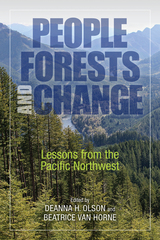
In People, Forests, and Change: Lessons from the Pacific Northwest, editors Deanna H. Olson and Beatrice Van Horne have assembled an expert panel of social and forest scientists to consider the nature of forests in flux and how to best balance the needs of forests and the rural communities closely tied to them. The book considers the temperate moist-coniferous forests of the US Pacific Northwest, but many of the concepts apply broadly to challenges in forest management in other regions and countries. In the US northwest, forest ecosystem management has been underway for two decades, and key lessons are emerging. The text is divided into four parts that set the stage for forests and rural forest economies, describe dynamic forest systems at work, consider new science in forest ecology and management, and ponder the future for these coniferous forests under different scenarios.
People, Forests, and Change brings together ideas grounded in science for policy makers, forest and natural resource managers, students, and conservationists who wish to understand how to manage forests conscientiously to assure their long-term viability and that of human communities who depend on them.
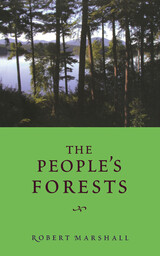
Devoted conservationist, environmentalist, and explorer Robert Marshall (1901-1939) was chief of the Division of Recreation and Lands, U.S. Forest Service, when he died at age thirty-eight. Throughout his short but intense life, Marshall helped catalyze the preservation of millions of wilderness acres in all parts of the U.S., inspired countless wilderness advocates, and was a pioneer in the modern environmental movement: he and seven fellow conservationists founded the Wilderness Society in 1935. First published in 1933, The People's Forests made a passionate case for the public ownership and management of the nation's forests in the face of generations of devastating practices; its republication now is especially timely.
Marshall describes the major values of forests as sources of raw materials, as essential resources for the conservation of soil and water, and as a “precious environment for recreation” and for “the happiness of millions of human beings.” He considers the pros and cons of private and public ownership, deciding that public ownership and large-scale public acquisition are vital in order to save the nation's forests, and sets out ways to intelligently plan for and manage public ownership.
The last words of this book capture Marshall's philosophy perfectly: “The time has come when we must discard the unsocial view that our woods are the lumbermen's and substitute the broader ideal that every acre of woodland in the country is rightly a part of the people's forests.”
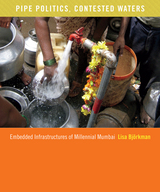
Despite Mumbai's position as India's financial, economic, and cultural capital, water is chronically unavailable for rich and poor alike. Mumbai's dry taps are puzzling, given that the city does not lack for either water or financial resources. In Pipe Politics, Contested Waters, Lisa Björkman shows how an elite dream to transform Mumbai into a "world class" business center has wreaked havoc on the city’s water pipes. In rich ethnographic detail, Pipe Politics explores how the everyday work of getting water animates and inhabits a penumbra of infrastructural activity—of business, brokerage, secondary markets, and sociopolitical networks—whose workings are reconfiguring and rescaling political authority in the city. Mumbai’s increasingly illegible and volatile hydrologies, Björkman argues, are lending infrastructures increasing political salience just as actual control over pipes and flows becomes contingent on dispersed and intimate assemblages of knowledge, power, and material authority. These new arenas of contestation reveal the illusory and precarious nature of the project to remake Mumbai in the image of Shanghai or Singapore and gesture instead toward the highly contested futures and democratic possibilities of the actually existing city.
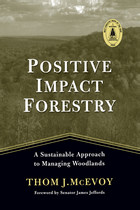
Positive Impact Forestry is a primer for private woodland owners and their managers on managing their land and forests to protect both ecological and economic vitality. Moving beyond the concept of "low impact forestry," Thom McEvoy brings together the latest scientific understanding and insights to describe an approach to managing forests that meets the needs of landowners while at the same time maintaining the integrity of forest ecosystems. "Positive impact forestry" emphasizes forestry's potential to achieve sustainable benefits both now and into the future, with long-term investment superseding short-term gain, and the needs of families -- especially future generations -- exceeding those of individuals.
Thom McEvoy offers a thorough discussion of silvicultural basics, synthesizing and explaining the current state of forestry science on topics such as forest soils, tree roots, form and function in trees, and the effects of different harvesting methods on trees, soil organisms, and sites. He also offers invaluable advice on financial, legal, and management issues, ranging from finding the right forestry professionals to managing for products other than timber to passing forest lands and management legacies on to future generations.
Positive Impact Forestry helps readers understand the impacts of deliberate human activities on forests and offers viable strategies that provide benefits without damaging ecosystems. It speaks directly to private forest owners and their advisers and represents an innovative guide for anyone concerned with protecting forest ecosystems, timber production, land management, and the long-term health of forests.
Named the "Best Forestry Book for 2004" by the National Woodlands Owners Association

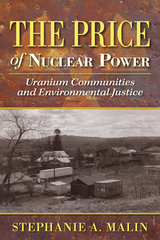

Biosphere 2 helped change public understanding of what our global biosphere is and how it provides for our health and well-being. However, the experiment is often dismissed as a failure, and news outlets at the time focused on interpersonal conflicts and unexpected problems that arose. Delving past the sensationalism, Nelson presents the goals and results of the experiment, addresses the implications of the project for our global situation, and discusses how the project’s challenges and successes can change our thinking about Biosphere 1: the Earth.
Pushing Our Limits offers insights from the project that can help us deal with our global ecological challenges. It also shows the intense and fulfilling connection the biospherians felt with their life support system and how this led to their vigilant attention to its needs.
With current concerns of sustainability and protection of our global biosphere, as well as the challenge of learning how to support life in space and on Mars, the largest, longest, and most important experiment in closed ecosystems is more relevant than ever. The book explores Biosphere 2’s lessons for changing technology to support and not destroy nature and for reconnecting people to a healthy relationship with nature.
READERS
Browse our collection.
PUBLISHERS
See BiblioVault's publisher services.
STUDENT SERVICES
Files for college accessibility offices.
UChicago Accessibility Resources
home | accessibility | search | about | contact us
BiblioVault ® 2001 - 2024
The University of Chicago Press









